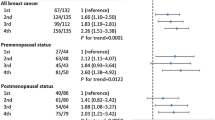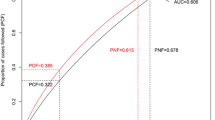Abstract
Genome-wide association studies have discovered multiple single nucleotide polymorphisms (SNPs) associated with the risk of common diseases. The objective of this study was to demonstrate the replication of previously published SNPs that showed statistical significance for breast cancer in the Malaysian population. In this case–control study, 80 subjects for each group were recruited from various hospitals in Malaysia. A total of 768 SNPs were genotyped and analyzed to distinguish risk and protective alleles. A total of three SNPs were found to be associated with increased risk of breast cancer while six SNPs showed protective effect. All nine were statistically significant SNPs (p ≤ 0.01), five SNPs from previous studies were successfully replicated in our study. Significant modifiable (diet) and non-modifiable (family history of breast cancer in first degree relative) risk factors were also observed. We identified nine SNPs from this study to be either conferring susceptibility or protection to breast cancer which may serve as potential markers in risk prediction.
Similar content being viewed by others
Abbreviations
- CI:
-
Confidence interval
- HWE:
-
Hardy–Weinberg equilibrium
- OR:
-
Odds ratio
- SNPs:
-
Single nucleotide polymorphisms
References
Jemal A, Bray F, Center MM, Ferlay J, Ward E, Forman D. Global cancer statistics. CA Cancer J Clin. 2011;61:69–90.
Pathy NB, Yip CH, Taib NA, Hartman M, Saxena N, Iau P, et al. Breast cancer in a multi-ethnic Asian setting: results from the Singapore–Malaysia hospital-based breast cancer registry. Breast. 2011;20(Suppl 2):S75–80.
Kenemans P, Verstraeten RA, Verheijen RHM. Oncogenic pathways in hereditary and sporadic breast cancer. Maturitas. 2004;49:34–43.
Moulder SL. Does the PI3K pathway play a role in basal breast cancer? Clin Breast Cancer. 2010;10(Suppl 3):S66–71.
Health Fact. In Book Health Fact (Editor ed. eds.). City: Health Informatics Centre Planning & Development Division, Ministry Of Health. 2008.
Cancer Incidence in Peninsular Malaysia, 2003–2005 The Third Report of the National Cancer Registry, Malaysia. National Cancer Registry. 2008; Vol.3.
Kohaar I, Tiwari P, Kumar R, Nasare V, Thakur N, Das BC, et al. Association of single nucleotide polymorphisms (SNPs) in TNF-LTA locus with breast cancer risk in Indian population. Breast Cancer Res Treat. 2009;114:347–55.
Zheng W, Wen W, Gao Y-T, Shyr Y, Zheng Y, Long J, et al. Genetic and clinical predictors for breast cancer risk assessment and stratification among Chinese women. J Natl Cancer Inst. 2010;102:972–81.
Evans DGR, Howell A. Breast cancer risk-assessment models. Breast Cancer Res BCR. 2007;9:213.
Hartman M, Suo C, Lim WY, Miao H, Teo YY, Chia KS. Ability to predict breast cancer in Asian women using a polygenic susceptibility model. Breast Cancer Res Treat. 2011;127:805–12.
Gail MH, Brinton LA, Byar DP, Corle DK, Green SB, Schairer C, et al. Projecting individualized probabilities of developing breast cancer for white females who are being examined annually. J Natl Cancer Inst. 1989;81:1879–86.
Wacholder S, Hartge P, Prentice R, Garcia-Closas M, Feigelson HS, Diver WR, et al. Performance of common genetic variants in breast-cancer risk models. N Engl J Med. 2010;363:2272.
Costantino JP, Gail MH, Pee D, Anderson S, Redmond CK, Benichou J, et al. Validation studies for models projecting the risk of invasive and total breast cancer incidence. J Natl Cancer Inst. 1999;91:1541–8.
Chen B, Wilkening S, Drechsel M, Hemminki K. SNP_tools: a compact tool package for analysis and conversion of genotype data for MS-Excel. BMC Res Notes. 2009;2:214.
Resler AJ, Malone KE, Johnson LG, Malkki M, Petersdorf EW, McKnight B, et al. Genetic variation in TLR or NFkappaB pathways and the risk of breast cancer: a case–control study. BMC Cancer. 2013;13:219.
Beeghly-Fadiel A, Lu W, Shu Xiao-Ou, Long J, Qiuyin Cai YX, Gao Y-T, Zheng W. MMP9 polymorphisms and breast cancer risk: a report from the Shanghai Breast Cancer Genetics Study. Breast Cancer Res Treat. 2011;126(2):507–13.
Roberts MR, Shields PG, Ambrosone CB, Nie J, Marian C, Krishnan SS, et al. Single-nucleotide polymorphisms in DNA repair genes and association with breast cancer risk in the web study. Carcinogenesis. 2011;32:1223–30.
Syamala VS, Syamala V, Sreedharan H, Raveendran PB, Kuttan R, Ankathil R. Contribution of XPD (Lys751Gln) and XRCC1 (Arg399Gln) polymorphisms in familial and sporadic breast cancer predisposition and survival: an Indian report. Pathol Oncol Res POR. 2009;15:389–97.
Zhang L, Zhang Z, Yan W. Single nucleotide polymorphisms for DNA repair genes in breast cancer patients. DNA Repair. 2005;359:150–5.
Li J, Jin W, Chen Y, Di G, Wu J, Shao Z-M. Genetic polymorphisms in the DNA repair enzyme ERCC2 and breast tumour risk in a Chinese population. J Int Med Res. 2008;36:479–88.
Ripperger T, Gadzicki D, Meindl A, Schlegelberger B. Breast cancer susceptibility: current knowledge and implications for genetic counselling. Eur J Hum Genet EJHG. 2009;17:722–31.
Zhang CX, Ho SC, Chen YM, Fu JH, Cheng SZ, Lin FY. Greater vegetable and fruit intake is associated with a lower risk of breast cancer among Chinese women. Int J Cancer. 2009;125(1):181–8.
Lima FE, Latorre Mdo R, Costa MJ MJ, Fisberg RM. Diet and cancer in Northeast Brazil: evaluation of eating habits and food group consumption in relation to breast cancer. Cad Saude Publica. 2008;24(4):820–8.
Fu Z, Deming SL, Fair AM, Shrubsole MJ, Wujcik DM, Shu XO, Kelley M, Zheng W. Well-done meat intake and meat-derived mutagen exposures in relation to breast cancer risk: the Nashville Breast Health Study. Breast Cancer Res Treat. 2011;129(3):919–28.
Fanale D, Amodeo V, Corsini LR, Rizzo S, Bazan V, Russo A. Breast cancer genome-wide association studies: there is strength in numbers. Oncogene. 2011;31:1–8.
McPherson K, Steel CM, Dixon JM. ABC of breast diseases. Breast cancer-epidemiology, risk factors, and genetics. BMJ Clin Res Ed. 2000;321:624–8.
Metcalfe KA, Finch A, Poll A, Horsman D, Kim-Sing C, Scott J, et al. Breast cancer risks in women with a family history of breast or ovarian cancer who have tested negative for a BRCA1 or BRCA2 mutation. Br J Cancer. 2009;100:421–5.
Acknowledgments
The authors gratefully thank and acknowledge all the study subjects for participating in this project and the contribution of multiple doctors and nurses in extending their assistance to our personnel in recruiting these subjects. This work was funded by INFOVALLEY® Life Sciences Sdn. Bhd.
Conflict of Interest
The authors declare that they have no competing interest.
Author information
Authors and Affiliations
Corresponding author
Additional information
Jagdish Kaur Chahil, Khamsigan Munretnam, Nurulhafizah Samsudin, Say Hean Lye, Nikman Adli Nor Hashim, Nurul Hanis Ramzi, Sharmila Velapasamy, Ler Lian Wee and Livy Alex have contributed equally to this work.
Electronic supplementary material
Below is the link to the electronic supplementary material.
Rights and permissions
About this article
Cite this article
Chahil, J.K., Munretnam, K., Samsudin, N. et al. Genetic Polymorphisms Associated With Breast Cancer in Malaysian Cohort. Ind J Clin Biochem 30, 134–139 (2015). https://doi.org/10.1007/s12291-013-0414-0
Received:
Accepted:
Published:
Issue Date:
DOI: https://doi.org/10.1007/s12291-013-0414-0




